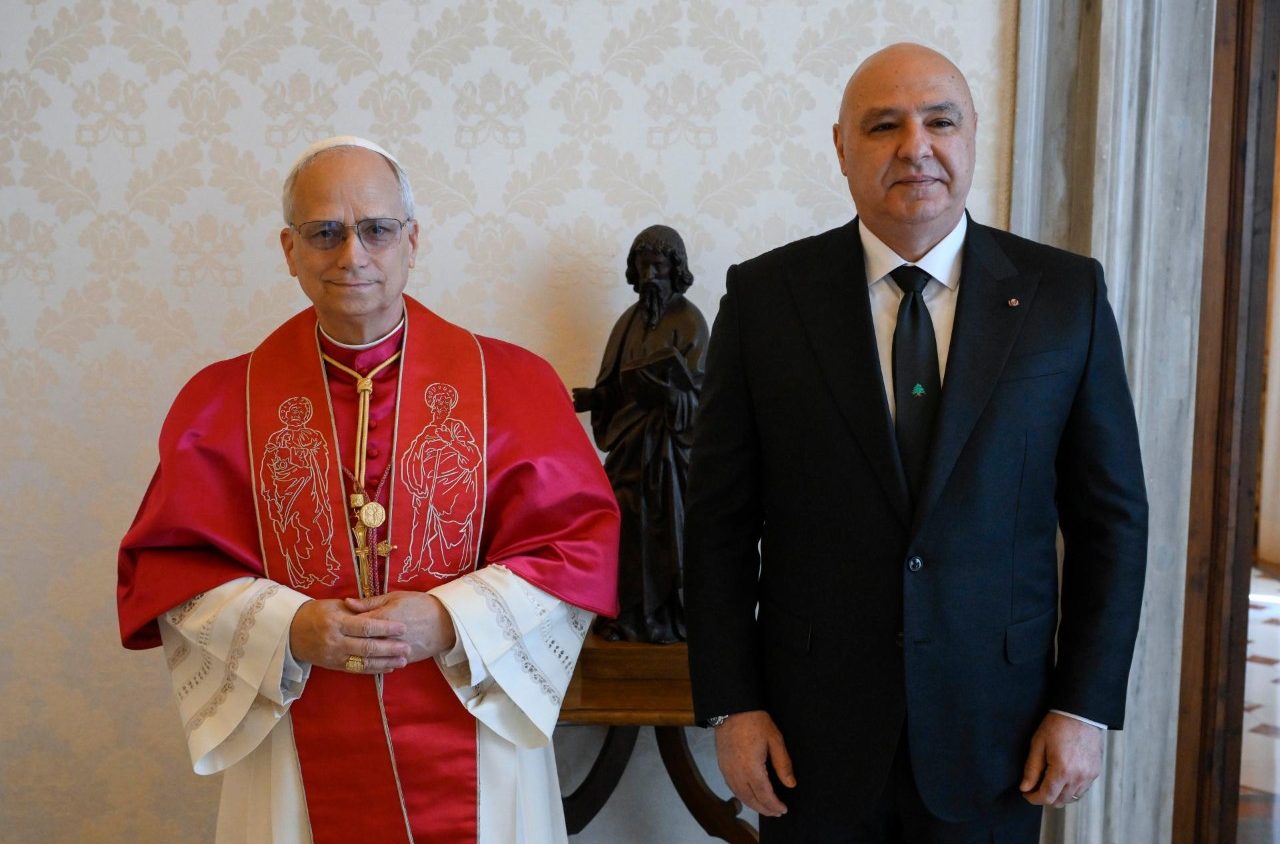Leo XIV receives Aoun: promoting peace in the Middle East is ‘a necessary and imperative need’
The Lebanese president is the first head of state from the region to meet the pontiff. Their meeting comes at the very time of Israel’s attack on Iran. In a statement, the Holy See refers to “good bilateral relations” with Lebanon and expresses support for its “stabilization and reform process”. There are concerns in Lebanon for the new war front, but Hezbollah says that it will not undertake “military initiatives”. The fate of UNIFIL is also at stake.
Beirut (AsiaNews) – Pope Leo XIV met Lebanese President Joseph Aoun, who arrived in Rome yesterday on an official visit during which he was expected to be received by the pontiff.
One of the points of their meeting this morning was the “the necessary and imperative need to foster the pacification of the entire Middle East region”.
This task is that more urgent given the sudden rise in tensions following Israel's attack on Iran last night, and Tehran’s military response against what it views as a virtual declaration of war.
During the “cordial talks” between the pope and the president, “reference was made to the good bilateral relations, expressing appreciation for the traditional and constant role of the Catholic Church in Lebanese society,” reads the press release by the Holy See Press Office.
Likewise, “hope was expressed that the country, through the stabilization and reform process, would experience a new season of political harmony and economic recovery, enabling it to strengthen the ideals of coexistence among faiths and the promotion of development that characterize it,” the Vatican statement added.
Aoun is the first head of state from the Middle East to be received in audience by Pope Leo XIV. He is visiting Rome accompanied by members of his family. The president later spoke with Cardinal Pietro Parolin, Vatican Secretary of State, and Mgr Mirosław Wachowski, Vatican Under Secretary for Relations with States.
In light of the developments overnight and the winds of war, the consequences for world peace were at the centre of the meeting given the direct confrontation between Iran and Israel.
This did not exclude the delicate situation in which Lebanon finds itself after the devastation wrought by the war between Israel and Hezbollah, less than seven months ago, and the ceasefire agreement of 27 November 2024. Recently, Lebanon has accused the Jewish state of constantly violating it with targeted drone attacks.
More recently, no less than nine buildings in Beirut’s southern suburbs were pulverised in an Israeli night attack on the pretext that the pro-Iranian party was not respecting the terms of the agreement.
Lebanese government sources report contacts between the Lebanese military and Hezbollah, with the aim of ensuring that every decision on war or peace is taken exclusively by the government, and that the “Party of God” does not undertake independent and unilateral military actions, a position, Hezbollah leaders confirmed this morning, stating that "on our part there will be no military initiatives".
In Lebanon, many fear that Iran might decide to take revenge against Israel by using ballistic missile sites that its Revolutionary Guards (Pasdaran) still maintain, according to some sources, on Lebanese territory.
It is known that the Lebanese army did not find anything at the bombed sites, leading to the belief that Israeli raids are nothing more than forms of pressure to speed up Hezbollah’s disarmament, if necessary by force.
It goes without saying that President Aoun could extend an invitation to the head of the Catholic Church to visit Lebanon and that he will inform the pope about the diplomatic ballet his country is involved in, most notably with the arrival of Jean-Yves Le Drian, special emissary of French President Emmanuel Macron, which will be followed in the coming weeks by Tom Barack, US ambassador to Turkey and special envoy for Syria. Massad Boulos, father-in-law of US President Donald Trump’s daughter Tiffany, and his senior advisor for the Middle East, is also expected, along with Michel Issa, the new US ambassador to Beirut. All three US officials are of Lebanese origin.
The fate of UNIFIL at stake
The diplomatic ballet essentially concerns the monopoly the Lebanese state must exercise over weapons, something that is urgently needs to assert.
In this regard, certain reports that appeared in Israeli media on 8 June are worrying Lebanese officials, namely an apparent accord between the US and Israel not to renew the UNIFIL mandate in August. For this reason, Lebanon is seeking guarantees, fearing that the withdrawal of the UN mission will allow Israel to expand its occupation zone and act without international witnesses.
“Israel has long been sceptical of UNIFIL,” said David Schenker, former assistant to the US Secretary of State for the Middle East and researcher at the Washington Institute.
For the former diplomat, the ceasefire mechanism now provides a “channel of communication between Israel and the Lebanese Armed Forces that would allow Israel to do without UNIFIL.”
However, this is not the view of France. Yesterday, Jean-Yves Le Drian stated in an interview with LBCI TV station that “questioning UNIFIL means exposing the South to a (new) risk of war” and perhaps to new territorial conquests.
Visiting Beirut, the French presidential envoy concluded by reiterating how important it is that the UN mission be “recognised, respected and strengthened in its role.”
10/08/2021 16:30







.png)










